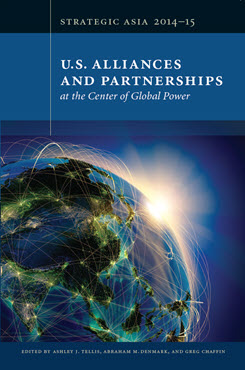U.S.-Vietnam Relations
Evolving Perceptions and Interests
This chapter from Strategic Asia 2014–15 examines the development of U.S.-Vietnam relations and discusses how changes in the regional balance of power, as well as changes within Vietnam’s domestic political system, since the end of the Vietnam War have driven both Washington and Hanoi to pursue a closer and more strategically significant relationship.
EXECUTIVE SUMMARY
This chapter examines the development of U.S.-Vietnam relations and discusses how changes in the regional balance of power, as well as changes within Vietnam’s domestic political system, since the end of the Vietnam War have driven both Washington and Hanoi to pursue a closer and more strategically significant relationship.
MAIN ARGUMENT
U.S.-Vietnam relations have come a long way, from enmity to partnership, thanks to two major geopolitical shifts that have created a convergence of strategic interests between both sides: Vietnam beginning to overcome its mistrust of U.S. intentions and commitment, and the rise of China and assertive Chinese behavior in the South China Sea driving worries in both Washington and Hanoi. It is in the interest of the U.S. to seek a strong, stable, and independent Vietnam that is capable and willing to stand up to Chinese pressure. Measures must be taken to improve Vietnam’s military and reduce mistrust between the two countries without losing sight of the need to promote the further democratization of Vietnam.
POLICY IMPLICATIONS
- As the U.S. seeks to hedge against the rise of China as the dominating power in Asia, Vietnam can be an important partner in the construction of a multipolar security structure to maintain peace and preserve U.S. influence in the region.
- Increased security cooperation depends on building mutual trust and convincing Vietnam that the U.S. has no strategic interest in undermining the current regime. At the same time, Vietnam must understand that the lack of progress in human rights is a major impediment to closer bilateral relations.
- The U.S. should find ways to include Vietnam in the Trans-Pacific Partnership and provide technical advice to help Vietnam undertake the economic, legal, and political reforms necessary to create an environment conducive to increased U.S. investment.
Strategic Asia
The Strategic Asia annual edited volume incorporates assessments of economic, political, and military trends and focuses on the strategies that drive policy in the region. Learn more about Strategic Asia.


